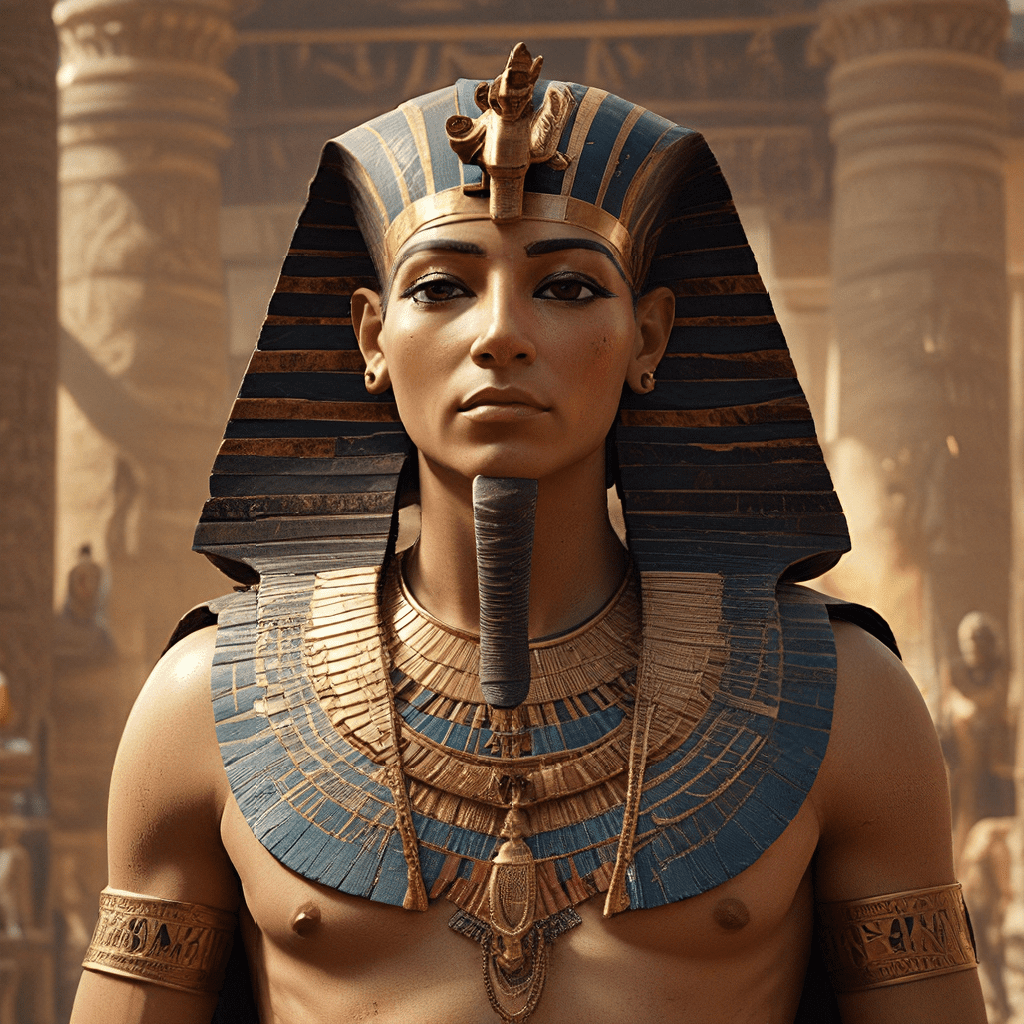I. Introduction: The Pharaoh’s Unique Role
In the ancient world, the Pharaoh of Egypt held a position unlike any other. They weren’t simply monarchs, but divine kings who ruled by right of the gods. This concept, known as the Divine Mandate, formed the cornerstone of Egyptian society and shaped their beliefs about their rulers. It wasn’t just about power or authority; it was about a sacred connection between the Pharaoh and the divine realm. This divine mandate allowed the Pharaoh to act as a bridge between the human and spiritual worlds, a conduit for the gods’ will on Earth. This dual nature – as both a human leader and a divine figure – made the Pharaoh an extraordinary figure in ancient Egyptian history.
II. The Pharaoh as Manifestation of Horus: The Divine Son
In Egyptian mythology, Horus, the falcon-headed god, played a pivotal role. He was seen as the divine son of Osiris, the god of the underworld, and Isis, the goddess of magic and motherhood. After Osiris’s murder, Horus avenged his father and became the rightful ruler of Egypt. This myth provided a template for how the Pharaoh was viewed. The Pharaoh was considered the living embodiment of Horus, inheriting his divine power and legitimacy. He was seen as the son of Ra, the sun god, and the heir to the divine throne. This connection to Horus, the divine son who ascended to rule, legitimized the Pharaoh’s authority and reinforced his role as the rightful ruler of Egypt.
III. The Pharaoh as the Living embodiment of Ra: The Sun God
Ra, the sun god, was a central figure in ancient Egyptian religion. He was the creator god, the source of life, and the bringer of light and order to the world. His daily journey across the sky symbolized the cycle of life, death, and rebirth. The Pharaoh’s connection to Ra was profound. He was seen as the physical manifestation of the sun god on Earth. This divine association gave the Pharaoh immense power and authority. He was believed to be capable of maintaining cosmic order, ensuring the sun’s rise each morning, and protecting Egypt from chaos and evil. This connection to Ra was fundamental to the Pharaoh’s role as the divine king, solidifying his position as the ultimate guardian and protector of Egypt.
IV. The Pharaoh as the Bridge Between the Divine and Human Worlds
The Pharaoh wasn’t simply a ruler; he was a mediator between the gods and the people. He was responsible for communicating the gods’ will and ensuring that their wishes were carried out. This role involved elaborate rituals and ceremonies, including temple visits, offerings, and festivals. The Pharaoh would perform sacrifices to appease the gods, ensuring their favor and protection over Egypt. His actions were seen as vital for the well-being of the kingdom, as the gods’ blessings were believed to bring prosperity, fertility, and good fortune. The Pharaoh was the link between the mortal realm and the divine, a crucial intermediary who ensured harmony and balance between the two.
V. The Divine King and the Ka: The Life Force
In ancient Egyptian beliefs, every person possessed a “Ka,” a unique life force that ensured their existence and continued after death. This “Ka” was a vital part of a person’s identity. However, the Pharaoh’s “Ka” held special significance. It was believed to be far more powerful and connected to the divine realm. The stability and well-being of the kingdom were directly linked to the strength of the Pharaoh’s “Ka.” This meant that maintaining a strong and healthy Pharaoh was crucial for ensuring the prosperity of Egypt. The Pharaoh’s “Ka” represented the very essence of the kingdom’s vitality and power.
VI. The Role of the Royal Family in Divine Kingship
The Pharaoh wasn’t alone in his divine role. His family, particularly his wife and children, played a crucial part in the divine mandate. The Pharaoh’s wife, the queen, was often seen as a powerful figure in her own right. She held a position of influence and authority, and her role in the divine mandate was significant. The Pharaoh’s children were also considered to be divinely connected. They were seen as the future inheritors of the throne and their well-being was essential for the continuation of the divine lineage. The royal family, collectively, formed a network of divine power, ensuring the stability and prosperity of Egypt.
VII. The Pharaoh’s Divine Authority and the Legitimacy of Rule
The Divine Mandate provided the Pharaoh with absolute power and authority. He was considered the chosen one, the representative of the gods on Earth. His rule was seen as divinely ordained, a reflection of the divine will. This belief had a profound impact on Egyptian society. It reinforced the Pharaoh’s position as the ultimate ruler, making him responsible for all aspects of Egyptian life, from religious ceremonies to military campaigns. It also emphasized the importance of obedience and loyalty to the Pharaoh, as he was seen as the embodiment of divine order and justice. The Pharaoh’s divine authority was not only a source of power but also a powerful tool for social control, ensuring the stability and unity of the kingdom.




